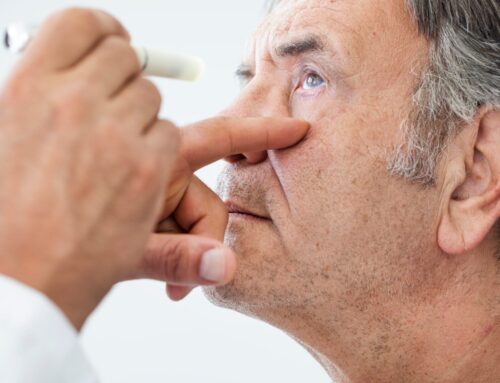
How To Manage Dry Eye After Cataract Surgery
For many people, cataract surgery can be a life-changing experience — restoring vision and improving the overall quality of life.
While the procedure itself is a resounding success, it’s important to acknowledge that some patients may encounter a common and often bothersome side effect during their recovery process — dry eye.
This relatively common side effect of cataract surgery can be an unexpected challenge, causing discomfort and temporary disruptions to daily life.
If you’ve undergone cataract surgery and you’re struggling to manage dry eye, or you have surgery booked in and you want to be prepared, we’re here to help. In this blog post, we explore the potential causes of dry eyes after cataract surgery and offer expert-backed recommendations to manage and alleviate dry eye symptoms. Take control of your eye health and wellbeing with Eye Clinic London.
Causes and symptoms of dry eyes after cataract surgery
It is quite common to have dry eyes after cataract surgery, which can be caused by all sorts of reasons:
- Prolonged use of antibiotic eye drops
- A reduced mucin (lubrication) production
- Secretion of fewer tears
- Decreased tear film production because of inflammation caused by surgery
You can read more about the causes of dry eye here.
Symptoms of dry eye after cataract surgery can include irritation, stinging, burning, redness and blurry vision when reading. You may also experience a sensitivity to light and an excess of tears in your eye as it tries to compensate for the dryness. These symptoms can vary in severity and duration.
If you experience dry eye symptoms after your cataract surgery, you must address them as soon as possible. Sometimes you’ll be able to alleviate your symptoms at home on your own, but in some cases, dry eyes need medical intervention.
Understanding postoperative care
After your cataract surgery, you must follow the aftercare advice from your surgeon to ensure optimal recovery and a reduced chance of dry eye.
We recommend doing the following in the first few weeks of your recovery:
- Use any recommended eye drops
- Use the eye shield provided while you sleep to stop you from accidentally rubbing your eyes at night
- Take pain relief medication if needed
- Use sunglasses outdoors
- Avoid swimming for four to six weeks
Here are some other tips after cataract surgery:
- Do not rub your eyes
- Do not get soap or shampoo in your eyes
- Do not drive until your doctor clears you
- Do not wear make-up for at least four weeks
- Do not look at screens for prolonged periods without regular breaks
Following aftercare guidelines properly is essential for recovery and will help prevent further complications. In particular, it is really important that you maintain good eye hygiene during your recovery and take any prescribed medication as recommended, such as antibiotic eye drops.
If you have any questions about cataract surgery, you can visit our FAQs.
If you feel discomfort during your recovery, take your prescribed medication or eye drops. You can also take over-the-counter pain relief medications, like ibuprofen.
If you experience severe discomfort, seek medical attention right away.
Strategies for treating dry eyes
While dry eyes can be frustrating and uncomfortable, there are proactive measures you can take to find comfort and relief. These may be lifestyle changes or medications, depending on the severity of your dry eye and what your doctor recommends.
Some positive lifestyle changes you can make that can help to alleviate dry eye symptoms include:
- Giving up smoking and avoiding being around smoke
- Not spending too long in air-conditioned or heated rooms as this can irritate your eyes more
- Use a humidifier at home to increase the moisture in the air
- Take regular breaks from computer screens
- Wear glasses instead of contact lenses
- Follow a healthy diet and include food rich in fatty acids and Omega 3-6.
If remedies aren’t enough to relieve your symptoms, you may need to try medical treatments for dry eye instead. These typically include eye drops (sometimes called artificial tear drops), which help to reduce inflammation in the eye’s surface and replenish the moisture in your eyes after cataract surgery.
As dry eye is a temporary side effect of cataract surgery, you should notice that your symptoms improve as you continue to recover after your procedure.
Preventive measures for long-term relief
After cataract surgery, you must continue with eye care even after fully recovering.
Taking good care of your eyes can help prolong their health and clear your vision. Ongoing eye care means attending regular check-ups and always speaking with your doctor if you experience new symptoms.
You can also reduce the recurrence of dry eyes by simply avoiding dry, dusty or smoky rooms, taking regular breaks from looking at screens, and protecting your eyes from the sun. You must also keep your eyes clean and avoid contact with anything that could irritate them.
Regular follow-up appointments with an eye care specialist can be extremely beneficial long term. The regular appointments will allow an expert to examine your eye health more frequently, and any treatments can be implemented sooner – which makes them more effective.
Dry eye after cataract surgery may be a common side effect, but it can be relieved and treated during recovery. The condition should clear up once you fully recover, but you must take good care of your eyes even after this point.
If you are experiencing problems with your eyes or have developed dry eye after cataract surgery, get in touch with Eye Clinic London. You can contact us by phoning 0203 807 4964 or requesting a callback. A member of our expert eye care team will be happy to help you manage your eye condition and provide the support you need.
Sources
https://www.nhs.uk/conditions/cataract-surgery/
https://www.mayoclinic.org/tests-procedures/cataract-surgery/about/pac-20384765
https://www.medicalnewstoday.com/articles/dry-eyes-after-cataract-surgery

About the expert
Mr Hamada | Consultant Ophthalmologist and Corneal Surgeon
MD, MSc, DO (hons), FRCSEd, FRCOphth I am Samer, founder and consultant ophthalmic surgeon with over 20 years’ experience in ophthalmology. I am a world-renowned specialist in cornea, cataract and refractive surgery. I’m not only a leading surgeon but also the only dual fellowship trained in corneal diseases in children from reputable institutions in the UK. At Eye Clinic London I work closely with other consultant ophthalmologists, optometrists and orthoptists to achieve the best outcomes for our patients. Our main aim is to make sure our patients get the safest and best treatments available to them. We put your safety before anything else so you can rest assured that if you choose us you will be in the best and safest hands.



